What is Social CRM? Benefits, Strategies, Tools
Social CRM has revolutionized how businesses connect with their audience. It is being widely used for leveraging platforms, building meaningful connections and harnessing valuable customer data.

Social CRM has revolutionized how businesses connect with their audience. It is being widely used for leveraging platforms, building meaningful connections and harnessing valuable customer data.

Do you want to improve customer relationships and enhance your business’s success? Building strong connections with customers is essential for any business to thrive. Technology continues to evolve and so does the way companies interact with their customers.
Social CRM might be the key you’ve been looking for to improve customer relationships. It has become increasingly vital for businesses looking to stay competitive and achieve long-term success. After all, 4.7 billion people are regularly active on social platforms. Brands have to leverage such platforms if they want to have a loyal customer base. Let us closely explore the concept, its importance and how businesses can effectively implement it to enhance their customer relationships to drive growth.
Social CRM (customer relationship management) refers to the evolution of traditional CRM systems by integrating social media channels and digital interactions into customer relationship management. It goes beyond simple database management to create a dynamic, two-way conversation between businesses and their customers across multiple platforms.
The system works by analyzing data from various social media platforms, customer service interactions, and digital touchpoints. When a customer interacts with a brand on platforms like Twitter, Facebook, or Instagram, Social CRM tools capture these interactions and combine them with existing customer data. The integration provides businesses with a comprehensive view of customer behavior, preferences and sentiment.
Key principles:
Explore the essential advantages of implementing Social CRM to understand how it can revolutionize your customer interactions.
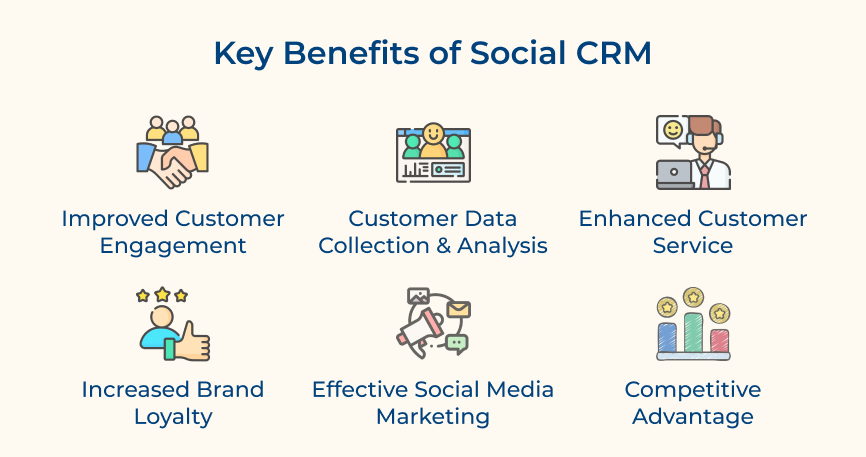
One of the main benefits of Social CRM is the ability to enhance customer engagement. Businesses can interact with customers in real time, respond to queries promptly and provide personalized customer service by utilizing social media platforms. Successfully engaged customers represent an average 23% premium in share of wallet, profitability, revenue, and relationship growth compared to average customers.
Social customer relationship management provides businesses with valuable customer data that can be used to understand customer preferences, behaviors, and demographics. The data allows businesses to tailor their marketing strategies and develop more targeted campaigns. Analyzing customer interactions on social media allows businesses to gain insights into their customer’s needs and preferences, enabling them to offer better solutions.
Social media CRM platform enables businesses to offer customer support through social media platforms. Customers often turn to social media to voice their concerns, ask questions, or provide feedback. Brands can improve their reputation and build customer trust by addressing their concerns. They can easily track and monitor customer queries, ensuring that no inquiry is left unanswered.
Enterprises can effectively cultivate brand loyalty by actively engaging with customers. Regularly interacting with customers on social media platforms opens the door to building a strong brand presence and establishing a personal connection. The connection promotes brand loyalty, as customers feel valued and appreciated. Satisfied customers are more likely to recommend a brand to their peers, leading to increased word-of-mouth marketing.
Social customer relationship management helps streamline social media marketing efforts. It gives insights on which social media platforms the target audience is most active on and then brands can focus their marketing efforts accordingly. The social CRM software enables them to track the performance of their social media campaigns. More than 90% of the leaders claim that social media data and insights have a positive influence on brand loyalty.
Implementing social media integration CRM gives businesses a huge competitive edge. Effectively utilizing social media platforms is the way to go for businesses to stay connected with their customers and stay ahead of their competitors. It helps businesses identify emerging customer trends, making it easier for them to make strategic business decisions and adapt to market changes.
Explore the different types of Social CRM systems and discover how they can transform the way you connect with your customers.
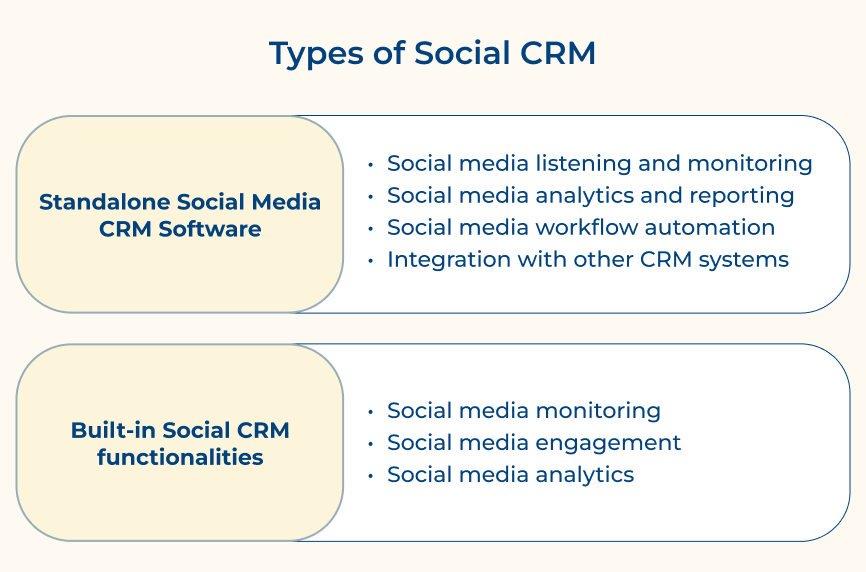
Many popular CRM platforms now come equipped with built-in social media customer relationship management functionalities. It means the social media monitoring, engagement, and analysis tools are integrated into the CRM system, providing a comprehensive solution for managing customer interactions across multiple channels.
Some common built-in social media customer relationship management functionalities include:
Enterprises may require more advanced or specialized social CRM capabilities that are not provided by the existing CRM system. Standalone social CRM software can be a viable option in such scenarios. They are specifically designed to focus solely on social media interactions, providing more robust features and functionality.
Some key features of standalone social media CRM software include:
Explore the fundamental differences between traditional and social CRM. Understanding these differences is crucial for choosing the right strategy to connect with today’s more connected and vocal customers.
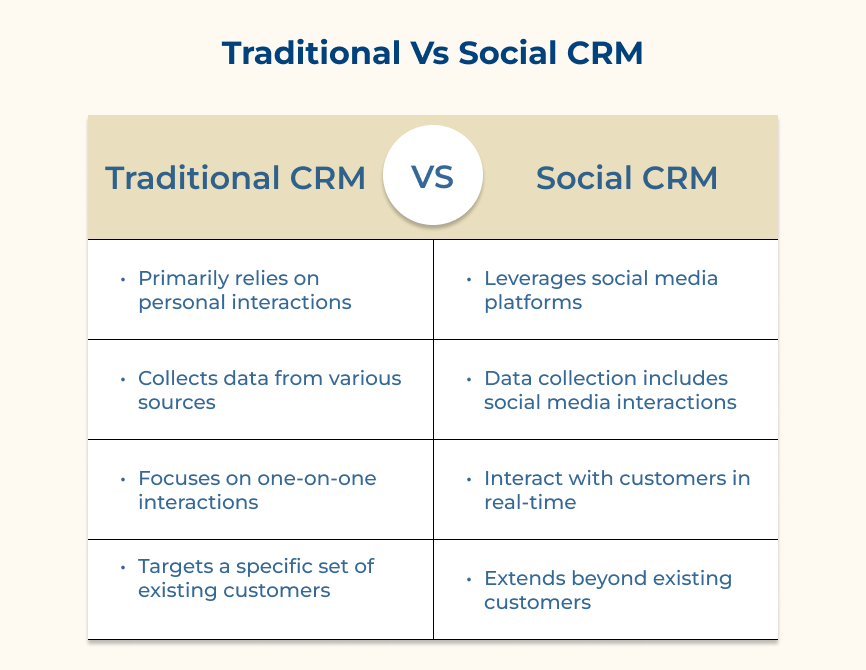
Traditional CRM primarily relies on internal data sources, such as customer records, sales transactions and support tickets. It captures data from direct customer interactions with the company.
Social CRM incorporates data from external sources, specifically social media platforms. It captures data from customer interactions on social media to gain a broader understanding of customer behavior and preferences.
Traditional CRM focuses on one-way communication, where companies reach out to customers through targeted marketing campaigns, sales calls and support interactions. The focus is on providing information and resolving customer issues efficiently.
The emphasis is on two-way communication in social CRM. Companies actively engage with customers through social media platforms, responding to their comments, addressing concerns and participating in conversations.
Traditional CRM provides insights into customer purchase history, preferences and past interactions with the company. It helps businesses identify trends, segment customers and develop targeted marketing campaigns.
Social CRM goes beyond transactional data. It provides a deeper understanding of customer sentiment, brand perception and social influence. Analyzing social media data allows companies to gain valuable insights into customer behavior, opinions and preferences in real-time.
Traditional CRM systems often work in isolation from marketing and sales efforts. They focus primarily on operational efficiency, data storage and customer support.
Social CRM integrates with marketing and sales strategies. Leveraging social media data allows companies to deliver personalized offers, tailor marketing messages and generate leads through social media channels.
Following are the essential steps you need to take to set up an effective Social CRM process that will transform your customer relationships and propel your business forward.
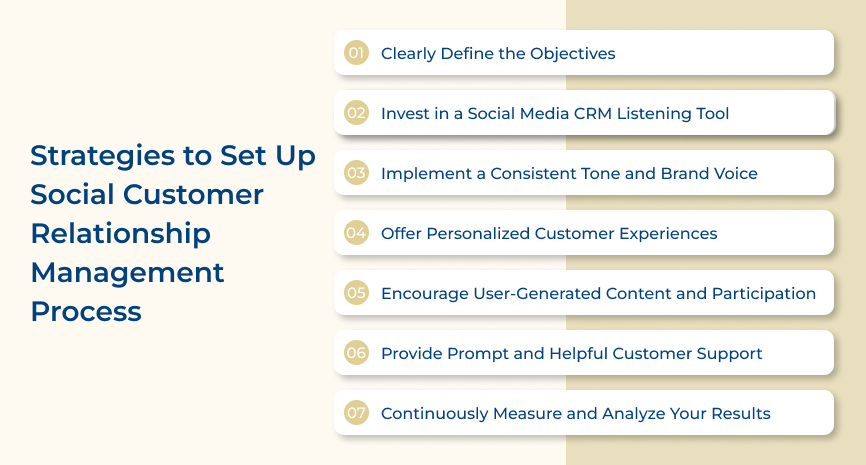
Before diving into the process, it is crucial to clearly define the objectives. Determine what the business aims to achieve through social media engagement. Having well-defined goals will guide the strategy and ensure the company is on the right track towards achieving them.
An example of the objective could be to increase customer engagement by 20% within six months. Another example can be to enhance brand loyalty by responding promptly to customer inquiries on social media platforms.
Pro tips:
Invest in a reliable social media listening tool to effectively manage the social media relationship. The tool will assist in monitoring conversations about the brand or industry, and identify customer sentiments. Companies can respond to their needs promptly, building trust and enhancing the overall customer experience by actively listening to the audience.
Let’s take an example of a fashion retailer that used a social media CRM listening tool to identify influencers and trending styles relevant to the target audience. They witnessed a significant boost in brand awareness by engaging with influencers and showcasing popular items.
Pro tips:
Consistency is key when it comes to social media engagement. Define a tone and brand voice that aligns with the brand identity. Make sure it is consistently applied across all social media channels. A consistent brand presentation increases revenue by up to 33%.
Imagine a company that prides itself on being fun and engaging should maintain a light tone in its social media interactions. The consistency not only helps build trust and loyalty among followers but also allows customers to easily connect with the brand.
Pro tips:
Personalization is becoming increasingly important now. Leverage the data you have collected through your Social CRM efforts to create personalized experiences for the customers. Tailor the content, offers and interactions to meet the specific preferences of the audience. 9 out of 10 marketers have witnessed increased ROI by implementing personalization strategies.
Think of a customer who has recently purchased a laptop. The company could send them personalized recommendations for laptop accessories or offer discounts on similar products. It will reflect the business understands the customer’s needs but also encourages repeat purchases.
Pro tips:
An effective strategy to step up the social CRM process is to involve the audience in the content creation process. Encourage users to create and share their content related to the brand or offerings. The user-generated content not only strengthens the sense of community but also provides valuable social proof and endorsements.
Let’s take an example of a clothing brand that encourages customers to post pictures wearing their outfits, showcasing different styles. The approach results in promoting brand awareness.
Pro tips:
Social media platforms have become popular channels for customers to seek assistance or voice their concerns. Providing exceptional customer support through social media can significantly enhance the brand’s reputation and customer satisfaction. Establish a dedicated customer support team that is well-trained in social media management and equipped to handle any issues effectively.
One example of providing prompt and helpful customer support is utilizing chatbots on social media platforms. The AI-powered tools can answer commonly asked questions instantly and provide solutions, ensuring customers receive timely assistance.
Pro tips:
Analysis of social efforts is vital to keep track of key performance indicators (KPIs) such as engagement rates, conversion rates and customer satisfaction metrics. The data will provide insights into the effectiveness of the strategies and help to identify the areas for improvement.
Let’s say a company runs a social media campaign targeting a specific demographic. They may discover that a particular platform or messaging style resonates better with their target audience. The analysis will give them the ideas to refine their future campaigns to target the platform or use that messaging style.
Pro tips:
Check out the key social CRM metrics you need to track to drive meaningful insights and facilitate stronger relationships with your audience.
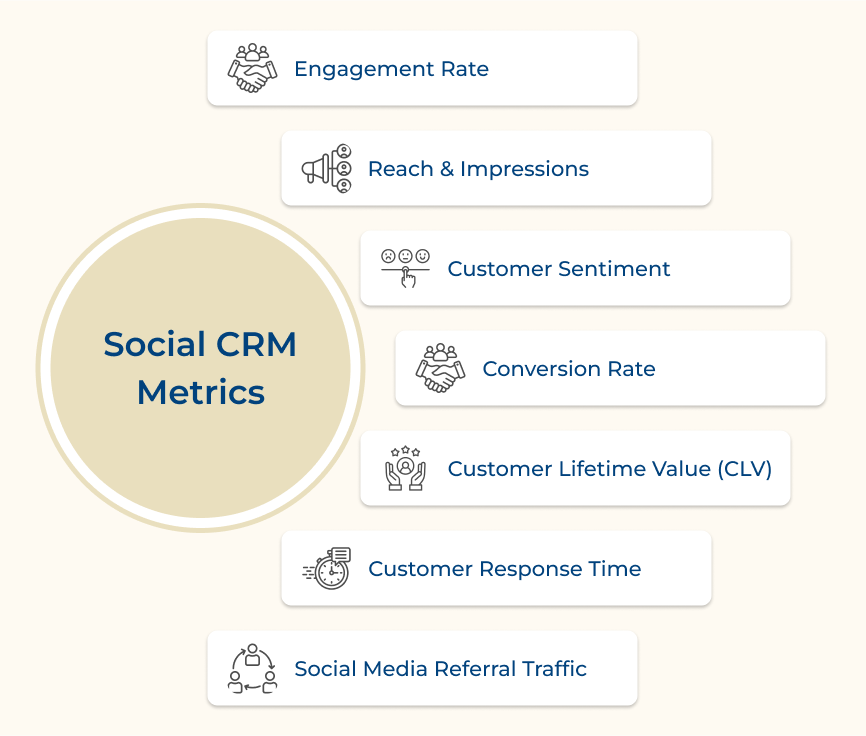
Engagement rate is a fundamental metric that measures the level of interaction between a brand and its customers on social media. It includes likes, comments, shares, retweets, and other forms of engagement. A higher engagement rate indicates that the content is resonating with the audience and facilitating meaningful connections.
Reach refers to the number of unique users who have seen the social media posts. Impressions represent the number of times the posts have been viewed. Monitoring reach and impressions helps in understanding the impact of the brand’s social media presence. The metrics help identify the reach of the marketing messages and the potential for brand exposure.
Customer sentiment analysis involves measuring the positive or negative sentiment expressed by customers about the brand on social media. Brands can identify areas of improvement, address customer issues, and capitalize on positive feedback by analyzing customer sentiment. Monitoring customer sentiment is vital for responding promptly and effectively to maintain a positive brand image.
The conversion rate measures the percentage of social media users who take a desired action, such as making a purchase, signing up for a newsletter, or downloading an ebook. It reflects the effectiveness of social media campaigns in driving tangible business results. Tracking conversion rates enables you to optimize the strategies to generate higher conversions.
Customer lifetime value is a metric that calculates the total value a customer brings to the business over their entire relationship with the enterprise. They can focus the social CRM efforts on nurturing and retaining customers by identifying high-value customers. Customers having an emotional connection to a brand have a lifetime value 4x higher than the average customer’s.
Customer response time measures how quickly the brand responds to customer inquiries or mentions on social media. Prompt responses demonstrate the commitment to customer satisfaction and build trust. Monitoring customer response time is important for evaluating the efficiency of customer service efforts and making necessary improvements.
The metric tracks the number of visitors to the website or landing page that originated from social media platforms. It assesses the effectiveness of social media channels in driving traffic and generating leads. Businesses can optimize their social media strategies to attract more relevant visitors to their websites by analyzing referral traffic.
Following are the key features of Social CRM software that can elevate your customer relationships, boost engagement and drive your business growth.
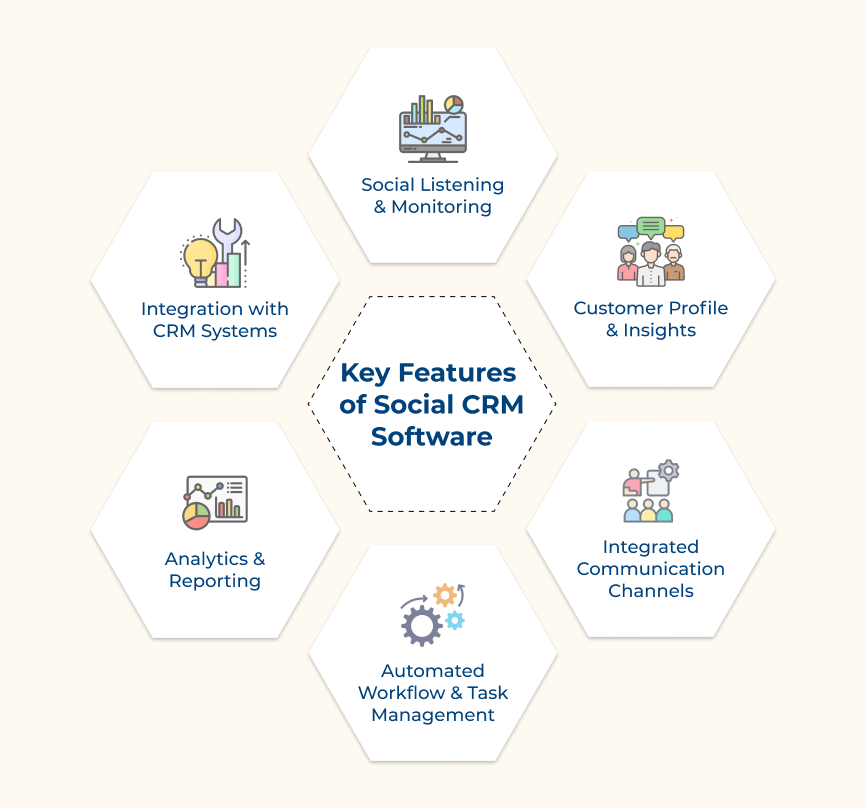
One of the primary features of the social media CRM platform is the ability to listen and monitor social media conversations happening around the brand. Tracking keywords, hashtags, and mentions is how businesses can stay informed about what customers are saying. The specific feature enables brands to address customer concerns, manage reputation, and identify opportunities for engagement.
Social CRM software provides businesses with detailed customer profiles that include information such as demographics, preferences, past interactions, and engagement history. The data enables businesses to understand their customers better, tailor their marketing strategies, and provide personalized experiences. The insights gained from social CRM software are beneficial for segmenting their audience and delivering targeted campaigns.
Social CRM software combines various communication channels into one platform, allowing businesses to manage customer interactions seamlessly. From social media interactions to email conversations, businesses can respond to customer inquiries, comments and complaints all in one place. The integration streamlines communication processes, improves response times, and enhances customer satisfaction.
Effective customer relationship management requires efficient workflow management. Social CRM tool enables businesses to automate repetitive tasks and set up workflows to ensure that nothing falls through the cracks. One can easily track the progress of customer inquiries and provide timely responses.
Measuring the success of social media efforts is crucial for businesses to understand the impact of their marketing strategies. Social CRM software provides robust analytics capabilities, allowing businesses to track key metrics, measure ROI, and gain insights into customer behavior. The analytics make it possible to make data-driven decisions, optimize social media campaigns, and identify areas for improvement.
Integration with existing CRM systems is essential for businesses that want a holistic view of customer interactions across all touchpoints. The social relationship management software that seamlessly integrates with CRM systems enables businesses to consolidate customer data, streamline processes and provide a unified customer experience.
Let us go through the top Social CRM tools that can help elevate your customer relationship strategy to new heights.
Veemo is a powerful social CRM tool that allows businesses to streamline their customer interactions across various social media channels. Its user-friendly interface and wide range of features are why Veemo has become the go-to platform for businesses looking to enhance their social media presence. The businesses that want to engage with their customers effectively should not look further from here.
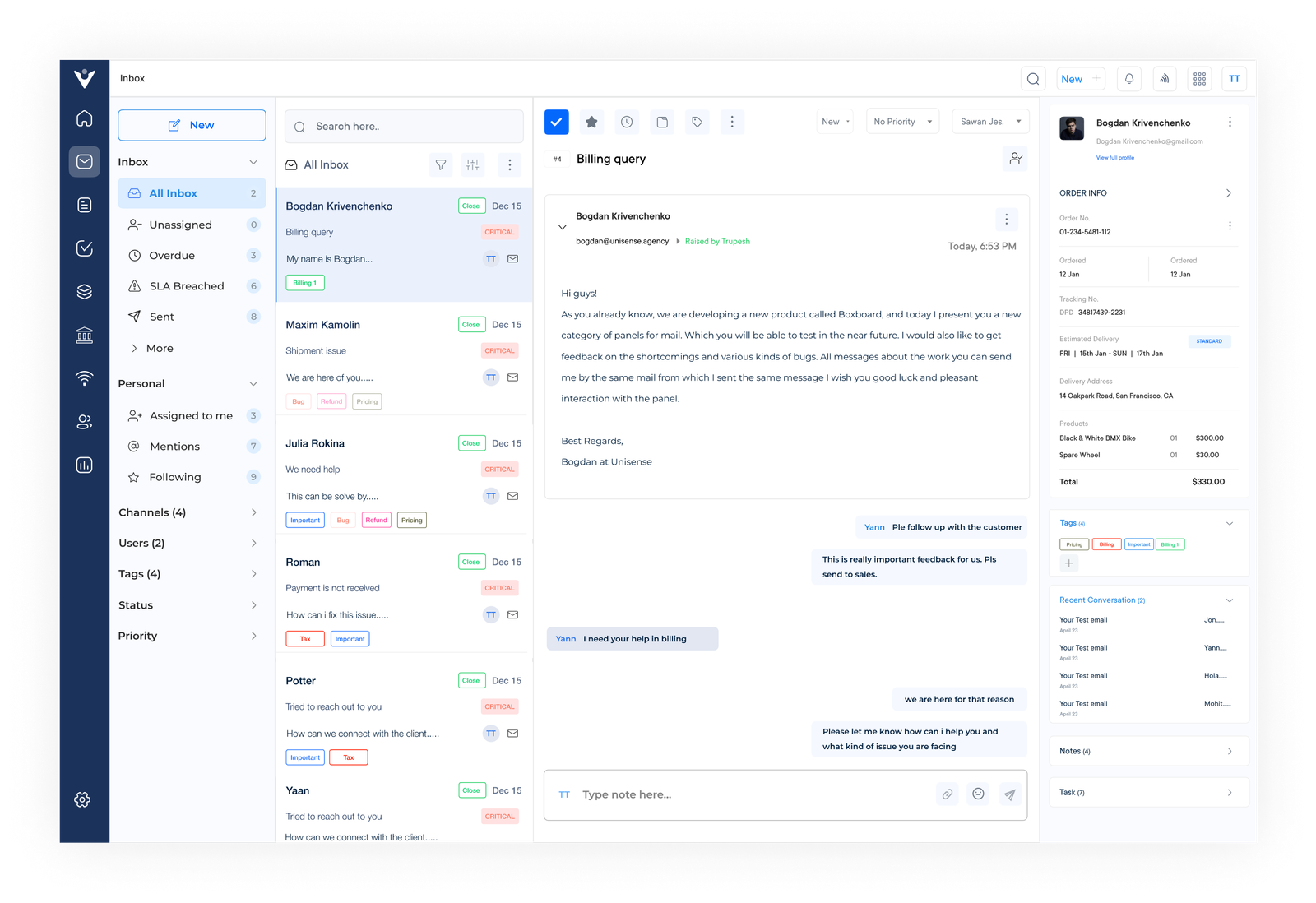
Key Features:
Pricing:
Veemo offers a Growth subscription which is ideal for small businesses and costs $34 per month. The team subscription is for $79 per month. It is suited for mid-size businesses and growing teams. Next is their most popular Premium subscription which comes at $119 per month which is perfect for mid-market and established organizations. Then comes the Enterprise subscription, crafted for large organizations and available for $149 per month.
Omni24 is a leading provider of customer engagement solutions that enable brands to connect with their customers on multiple channels. It helps businesses streamline their social media interactions, providing a cohesive user experience for both the company and its customers. Their tool is renowned for its advanced features and user-friendly interface, making it a preferred choice for businesses of all sizes.
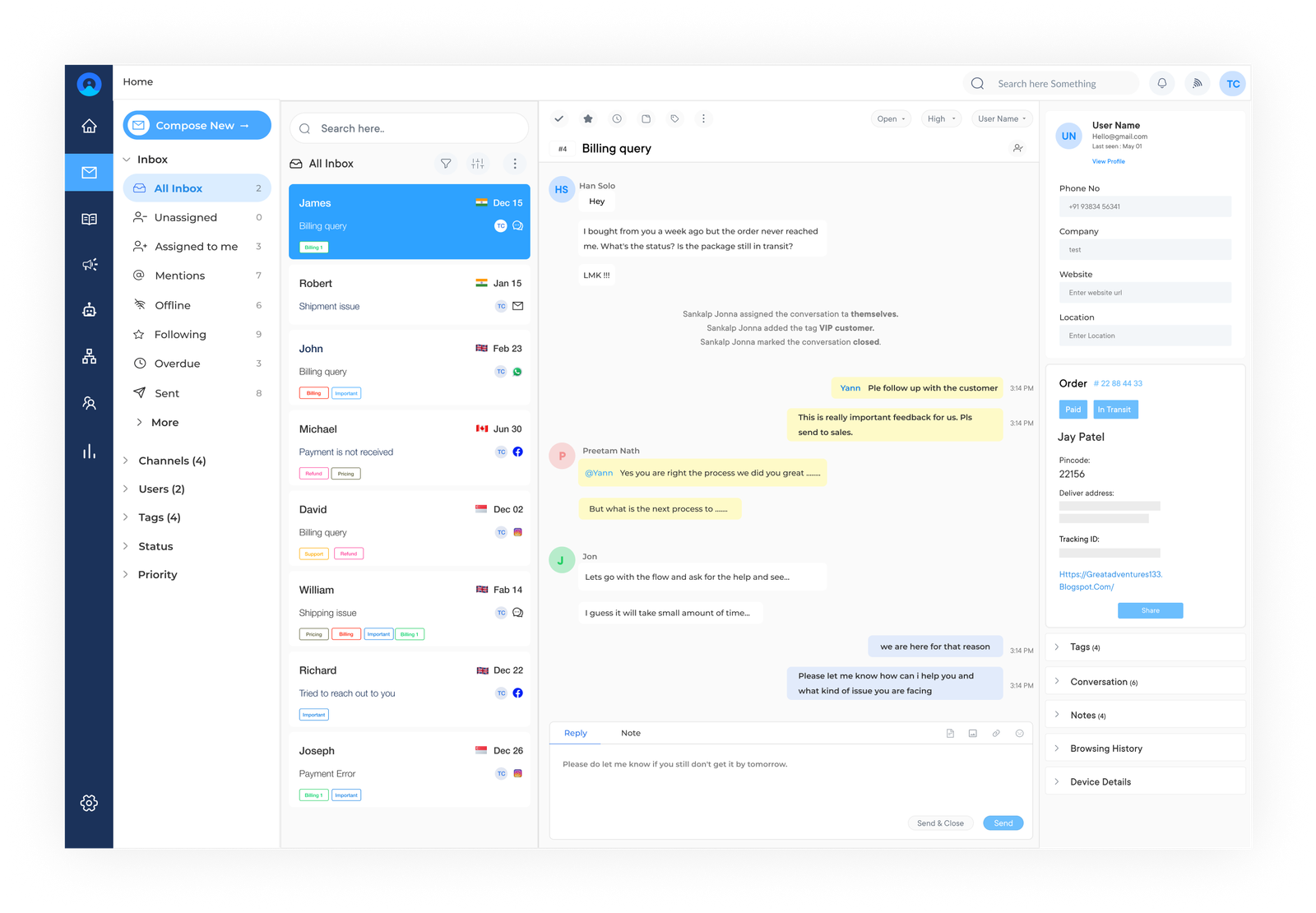
Key Features:
Pricing:
Omni24 provides flexible pricing options to cater to businesses of all sizes. The pricing structure is based on the number of customer service agents and the specific features required. omni24 offers three pricing plans: Basic, Professional, and Enterprise. The Basic plan starts at $29 per agent per month, offering core CRM functionality. The Professional and Enterprise plans offer advanced features and customization options, with prices varying based on the specific requirements of each business.
HubSpot offers a diverse range of CRM tools, including a social media management feature. It allows businesses to schedule social posts, monitor brand mentions, collaborate with teams, and track customer interactions.
Zoho CRM provides businesses with an all-in-one customer engagement solution that includes social media management. Its features include social media monitoring, lead management, collaboration tools, and analytics.
Agorapulse is designed to simplify social media management for businesses. Its key features include content scheduling, social listening, competitor analysis, CRM integration, and detailed reporting.
Mention focuses on social listening and monitoring to help businesses track brand mentions across social media platforms. It offers real-time alerts, sentiment analysis, competitive intelligence, and performance metrics.
Salesforce Social Studio is a robust social CRM tool that offers a unified platform for managing social media interactions. Its features include scheduling, social listening, engagement automation, sentiment analysis, and reporting.
Buffer is a popular social media management platform that allows businesses to plan, schedule, and analyze their social media content. It supports multiple platforms, provides detailed analytics, and offers team collaboration features.
Brandwatch is a powerful social listening tool that helps businesses analyze and understand customer conversations across social media platforms. It offers sentiment analysis, trend tracking, influencer identification and data visualization.
Sprinklr is an enterprise-level social CRM tool that provides businesses with a comprehensive suite of social media management and customer engagement features. It offers social listening, content creation, campaign management, analytics, and governance.
Following are the essential best practices that will help you harness the true power of social CRM, transforming your customer interaction and your brand.
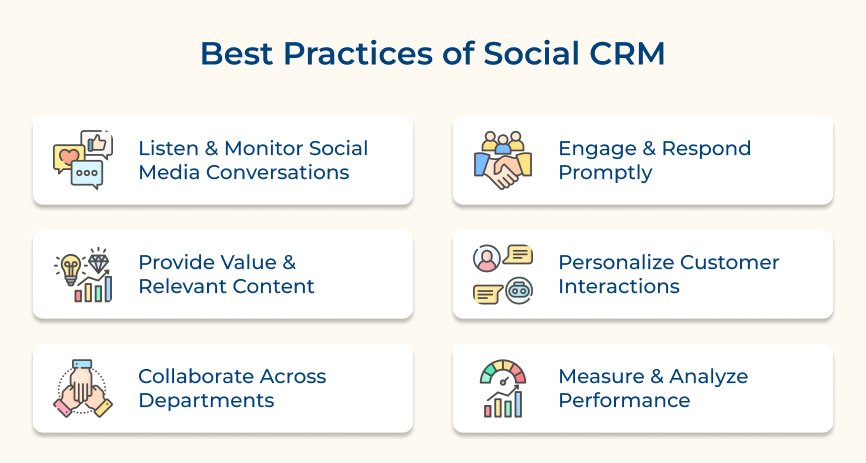
The first step in implementing a social CRM tool is to listen and monitor conversations happening on social media platforms. Enterprises can gain valuable insights into customer preferences, opinions, and concerns by using social listening tools. The insights can then be used to tailor marketing strategies and provide personalized customer experiences.
One of the key components of social relationship management is actively engaging with customers on social media. Responding promptly to customer inquiries, comments and complaints shows that the company is committed to providing excellent customer service. It is essential to establish a dedicated team or individual responsible for managing social media interactions and ensuring timely responses.
Social media platforms offer an opportunity to share valuable and relevant content with customers. Consistently creating and sharing engaging content enables brands to position themselves as trusted industry leaders and build lasting relationships with the target audience. Content should be tailored to the specific needs and interests of customers, adding value to their social media experience.
Personalization is a key aspect of social CRM. Tailoring interactions and content to individual customers’ interests can significantly enhance customer engagement. 76% of the customers get frustrated when companies don’t deliver personalized interactions doesn’t happen. An example can be to send targeted offers or recommendations based on customers’ previous purchases or social media interactions.
Collaboration across different departments within the organization is crucial to effectively implement social CRM strategies. Sales, marketing, customer service, and even product development teams should work together to gather customer insights. They should be sharing the findings. The cross-department collaboration ensures a seamless customer experience across all touchpoints, resulting in improved customer satisfaction and loyalty.
Continuous analysis of social CRM performance is necessary to optimize strategies and improve results. Utilize social media analytics tools to track key metrics such as engagement rates, customer sentiment, and conversion rates. The insights will help identify areas of improvement and guide future decision-making, ultimately leading to more effective CRM initiatives.
Implementing Social CRM strategies can greatly enhance your customer relationships and drive business success. Businesses can gather valuable customer data, understand their preferences, and engage with them on a more personal level by leveraging social media platforms.
The use of social media CRM platforms leads to building stronger connections, provides personalized experiences, and ultimately increases the loyalty of the customer base. Social CRM is no longer a luxury but a necessity to survive and thrive in the highly competitive market. So, embrace the power of social media relationship management tools and watch your customer relationships thrive.
Social CRM or social customer relationship management, can greatly benefit businesses by improving customer relationships and loyalty. It allows companies to engage with their customers on social media platforms, gaining valuable insights and resolving issues promptly. Companies can build stronger relationships, enhance customer satisfaction, and ultimately increase loyalty, leading to long-term growth.
Integrating social relationship management tools with existing customer data and systems can be achieved by employing various methods. One way is to use application programming interfaces (APIs) to connect different platforms and synchronize data. Another option is to utilize data integration platforms that can consolidate and unify customer information across various channels. Data migration tools can be utilized to transfer data from existing systems into social CRM platforms, ensuring a seamless integration process.
Social CRM can be a powerful tool for customer acquisition as it enables businesses to identify and target potential customers based on their social behavior. Businesses can identify prospects who are most likely to be interested in their solutions by analyzing social media data. Engaging with potential customers on social media is how enterprises have been building brand awareness and driving traffic to their websites or physical stores.
Social CRM is indeed beneficial for a wide range of businesses. The suitability depends on various factors. It is particularly useful for businesses operating in industries where social media plays a significant role in customer communication and brand promotion. Brands that value customer feedback and strive to provide personalized experiences can greatly benefit from social media integration CRM.

Market better, sell faster and support smarter with Veemo’s Conversation Customer Engagement suite of products.
Unify all your customer data in one platform to deliver contextual responses. Get a 360 degree view of the customer lifecycle without switching tools.
Connect with the tools you love to reduce manual activities and sync your business workflows for a seamless experience.
 https://veemo.io/wp-content/uploads/2025/12/customer-connection.png
1256
2400
Indrasish Singha
https://veemo.io/wp-content/uploads/2024/11/veemo.svg
Indrasish Singha2026-02-06 09:11:372026-01-19 09:14:05What is Customer Connection: Mistakes, Metrics & Examples
https://veemo.io/wp-content/uploads/2025/12/customer-connection.png
1256
2400
Indrasish Singha
https://veemo.io/wp-content/uploads/2024/11/veemo.svg
Indrasish Singha2026-02-06 09:11:372026-01-19 09:14:05What is Customer Connection: Mistakes, Metrics & Examples https://veemo.io/wp-content/uploads/2025/12/complaint-management.png
1256
2400
Indrasish Singha
https://veemo.io/wp-content/uploads/2024/11/veemo.svg
Indrasish Singha2026-02-03 09:04:022026-01-19 09:10:02What is Complaint Management? Importance, Key Steps & Strategies
https://veemo.io/wp-content/uploads/2025/12/complaint-management.png
1256
2400
Indrasish Singha
https://veemo.io/wp-content/uploads/2024/11/veemo.svg
Indrasish Singha2026-02-03 09:04:022026-01-19 09:10:02What is Complaint Management? Importance, Key Steps & Strategies https://veemo.io/wp-content/uploads/2025/12/AI-Self-Service.png
1256
2400
Indrasish Singha
https://veemo.io/wp-content/uploads/2024/11/veemo.svg
Indrasish Singha2026-01-26 09:52:482026-01-13 10:17:07What is AI Self Service? Benefits, Key Metrics and Best Practices
https://veemo.io/wp-content/uploads/2025/12/AI-Self-Service.png
1256
2400
Indrasish Singha
https://veemo.io/wp-content/uploads/2024/11/veemo.svg
Indrasish Singha2026-01-26 09:52:482026-01-13 10:17:07What is AI Self Service? Benefits, Key Metrics and Best PracticesGrow Customer Relationships and stronger team collaboration with our range of products across the Conversational Engagement Suite.

 7 Tips To Improve Customer Focused Culture
Scroll to top
7 Tips To Improve Customer Focused Culture
Scroll to top